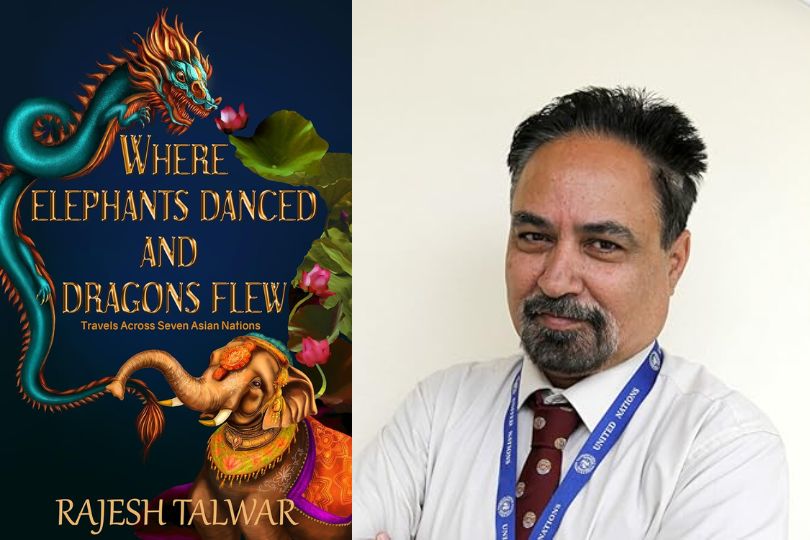Interview with Raajesh Talwar Author of “Where Elephants Danced and Dragons Flew”
Explore the enchanting world of 'Where Elephants Danced and Dragons Flew' in an exclusive interview with Raajesh Talwar on Frontlist. Discover the magic and inspiration behind the book.on Dec 28, 2023

Frontlist: What motivated you to explore the genre of travel writing, given your track record of authoring books in various other genres? Is there a particular inspiration or reason behind your decision to embark on this new venture into the world of travelogues?
Rajesh: Many writers stick to a particular genre, be it thrillers, romantic fiction, or even literary fiction. As a writer, I like to stretch myself and try new genres. Although I have written thirty-eight books across multiple genres, I had thus far not written a travel book. So, this was a challenge I set myself. I should add that the book published just before this was a collection of short stories. It was my very first collection of short stories and a new genre I had attempted. During the next year or so, I will attempt to write a book of poetic prose on a spiritual theme. This will be something special because I have not written any poetic prose thus far, and to do so in the spiritual realm is a huge challenge I am setting myself. If I succeed in creating something worthy, it would be in a genre I have not attempted before, providing me with exceptional satisfaction.
Frontlist: Did you embark on your journey with the specific intention of creating this book, or did the idea of sharing your experiences through a book emerge naturally during your travels?
Rajesh: I had no idea of writing a travel book while embarking on those travels. The idea emerged naturally because I have a habit, as a writer, of taking notes of places I visit. My plan is eventually to visit all the countries in Asia. Thus far, I have visited around twelve Asian nations. Of these, I could write on seven nations where the traveling was especially memorable and could be integrated into a single book.
Frontlist: Your book lacks any accompanying pictures of your journey. Do you believe incorporating images would provide a more personal touch and offer readers a deeper insight into the places you visited?
Rajesh: My travelogue differs from most other travel books in that it focuses more on the people I met than on physical descriptions of landscapes and monuments. Many reviewers have commented on this unique aspect of the book. It has attempted to paint a cultural snapshot of each nation visited. Images would suit a coffee table travel book more than a book of this nature, which attempts to go beneath the surface to explore the psyche of the people in each of the nations I visited.
Frontlist: Your book seems to encompass the positive and negative aspects of the countries you visited, whereas many authors focus primarily on the positive. What motivated you to provide a more balanced portrayal of these places in your writing?
Rajesh: I believe a writer's calling is to tell the truth as they see it. There is indeed no need to be unnecessarily offensive. I believe I have been careful in trying not to cause any offense. At the same time, I would also not want to paint any false illusions about the places. I have visited. Some of my readers may embark on journeys based on what they have read and will be disappointed if they have only read rosy-tinted descriptions. This way, they will know what to expect.
Frontlist: Given that everyone's travel experiences can be unique, did you anticipate or encounter any backlash for portraying the negative aspects of the countries you visited alongside the positive ones?
Rajesh: There was no backlash, but I did write keeping local sensitivities and sensibilities in mind. For instance, I write about dog eating in Cambodia, but at the same time, I speak of how many Cambodians believe that it should be discouraged as it was not a part of their original culture. Such people argue that it was an imposition by Pol Pot, who was, in turn, unduly influenced by Mao Zedong. I also think you get a backlash more often when you only criticize or criticize unfairly. Some European friends found my piece on China to be extremely well-balanced. Although I have been critical of China in that article, I have also praised the nation where I felt it was deserving. On the other hand, if I were to write a book on geopolitics, which I may do in the future, given my background with the United Nations, I would be far more critical of the Chinese state.
Frontlist: You mentioned that English and Japanese share many commonalities despite the perception of them as distinctly different cultures. Could you provide more insights into the specific cultural aspects or elements you found in common between these two societies based on your experiences and observations?
Rajesh: Interestingly, both are island nations, and both have been colonizers. That's something they share in common, but there are other things. The English are generally courteous amongst their people, and this is the case with the Japanese, too. If anything, the Japanese are more courteous. The Japanese and the English both have a strong sense of privacy. The Japanese are even more private than the British. In India, for instance, passengers on trains will often be found chatting with each other like long-lost friends. When I studied at the University of Nottingham, I was surprised by how train passengers would hardly ever engage with their co-passengers. At the most, there would be a cursory nod or acknowledgment to someone who may have been traveling on the same train with them for years, and then the English would unfurl their newspapers and begin reading. Similarly, in Japan, you cannot talk on the mobile while traveling on a bus or train out of respect for the privacy of other passengers. There are other common features, but perhaps reading the book for a fuller discussion is best.
Frontlist: Having traveled through seven different Asian nations, can you share which particular place or experience stood out to you the most, leaving you either thoroughly impressed or genuinely amazed?
Rajesh: I cannot think of a particular nation that impressed me the most, but I would like to mention three things that stood out for me in different countries. In terms of sheer enjoyment, I suppose I enjoyed Bali the most. It wasn't only about pleasure, though. Bali is very accomplished in making handicrafts, and traveling through different towns there gave me a strange, unearthly glimpse of Ancient India. Vietnam impressed me in terms of its human capital. Young Vietnamese students' open-mindedness, friendliness, and intelligence are truly remarkable. Finally, of course, there is Angkor Wat in Cambodia, which has to be seen to be believed. It should be on the go-to list of every Indian traveler.



.jpg)






.jpg)

.jpg)
.jpg)
.jpg)

.jpg)
.jpg)

.jpg)








Sorry! No comment found for this post.